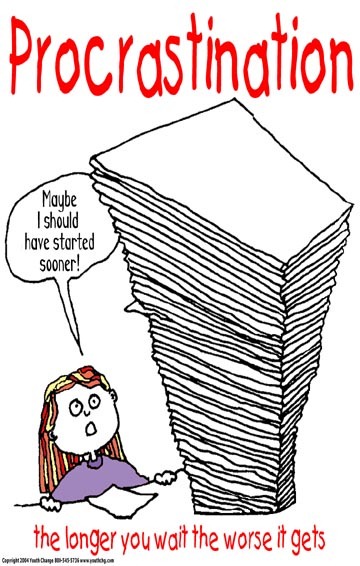Procrastination
A few years ago, I thought of an idea for a novel. It has all of the essential ingredients for a great story – plot, setting, characters, action, suspense, historical context. The plot lines and character developments have run through my head from time to time, and the story gets better each time I think about it. I’ve also done a fair amount of research, since it is important to me that the story be historically accurate.
The main thing that I hadn’t done was write anything. When I say that I hadn’t written anything, what I mean is that I wrote nothing.
I always assumed that I would get into it “someday”. In the meantime, there were too many distractions, what with my day job, family, volunteer work, and all. I always assumed that I would have to take care of these other things first, and free up a large block of time, before I could begin the novel.
The light bulb went off in my feeble brain a week or so ago, and I finally realized that I will never free up a large enough block of time. There will always be other demands on my mind and on my time. I had to either give up the dream of writing a novel, or else get started on the writing.
I chose to get started!
Thus far, I’ve only completed five or six pages, 2,000 words or so. What is the “Great American Novel” anyway? 50,000 words? 100,000? By any measure, I’ve got a long way to go.
I’ve done a bit of research for some suggestions on how to complete this. I even found a course at suite101.com entitled You Can Write A Novel in 30 Days. There were some helpful hints there, but there is no way I will finish this in 30 days. 30 months, maybe. 30 years, more likely.
I’m tempted to put a counter somewhere on this website, with the number of pages or words completed to date. It’s not that any Café visitor cares about my progress. It’s simply that the posting of my progress on the internet might shame me into, in fact, making progress.

To make such progress, I will need to do a bit of multitasking, something I wrote about earlier this month. If you remember, we addressed then the expanded timeline associated with multitasking. The problem is that sometimes multitasking can’t be avoided.
Take this as a scenario (which is typical of many workdays). You have 10 problems or projects which require your attention. Some of them can be completed relatively quickly; a few of them will require more time; and the 10th one is a major long-range project.
Which problem do you address during the workday (or workweek)? If you are like most people, you take care of the easiest one first. Once those are disposed of, you tackle the more difficult ones. You put off doing “number 10” sine that will require the most attention. You rationalize the situation and tell yourself that you will get to it when you can devote sufficient time to get it done.
Guess what? That time may never come.
If it is something that you really want to do, or that really needs to get done, there is only one way to do it. And that is, get started. You can’t finish unless you start, and you might as well start at the beginning.
I did a google search of “procrastination” and it pulled up thousands of sites. Interestingly, many of these were “.edu” postings – university publications directed towards students, with how to identify and combat the tendency to procrastinate.
I shouldn’t have been surprised by this. Who among us didn’t put off studying for an exam, or completing a term paper or lab report? It was actually quite nice to see that universities are concerned about this and have offered suggestions on how to cope. (I don’t remember anyone at the U caring about my procrastination when I was a college student.
One of the better of these websites is a University of Guelph site. It suggests combating procrastination with realistic goal setting, careful planning (including planning to work and planning to play), and the “making a molehill out of a mountain” method. This latter method is taking a difficult, overpowering problem and dealing with it in smaller segments.

A California Polytechnic State University site also identifies a number of particular types of procrastination, with suggestions for dealing with each one.
A mental health website seems to suggest that procrastination is sort of a disease – serious, but treatable. Procrastination is caused by fear, and each procrastinator develops and responds to his or her own specific fears. A procrastinator may respond to the fear by admission, or even exaggeration, of the problem (and become overwhelmed), or by denial (“No worries. I’ll take care of it later.”) Either way, the procrastinator doesn’t get started.
I don’t think I put off starting this novel because of a mental illness. I do think that I put it off out of fear. Not fear of the size of the task, but fear that I would not be able to do it. I am absolutely positive that this is a good story, but I have no idea whether I have the skills to tell it.
I’ve come to the realization that I will be extremely upset with myself if I do not try. To combat the fear, I’m also taking the “No Worries” approach. I’m not going to fret or brood about this. If I’m able to complete the novel, and if it is “good”, then great. If not, then so be it.
Anyway, I started at the beginning, and I will work my way through the middle and to the end.
I’ll let you know when I get there.
